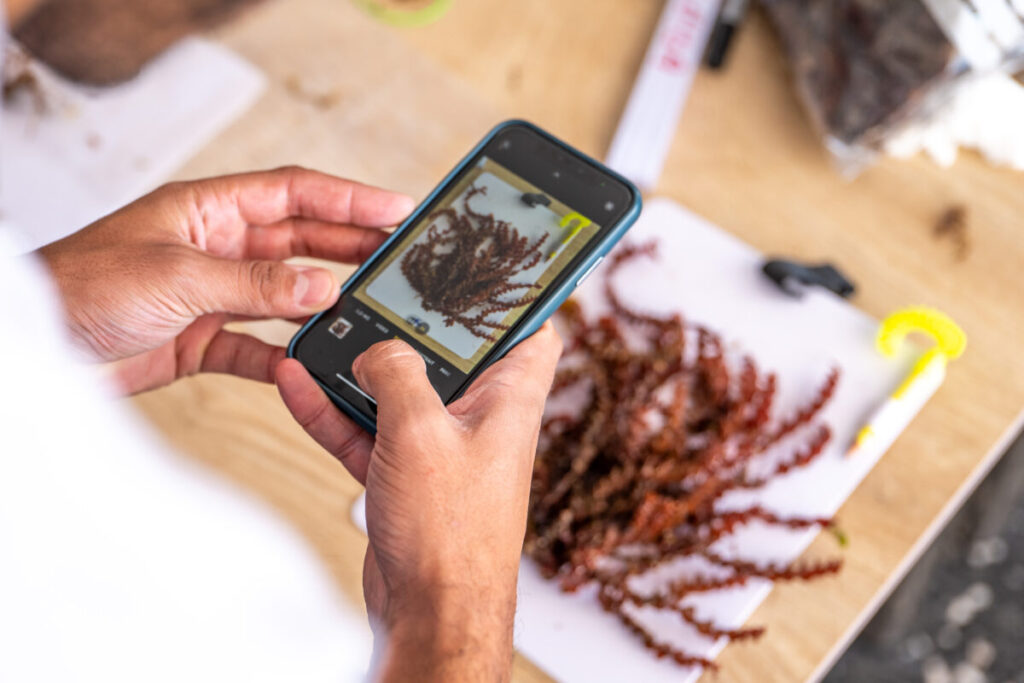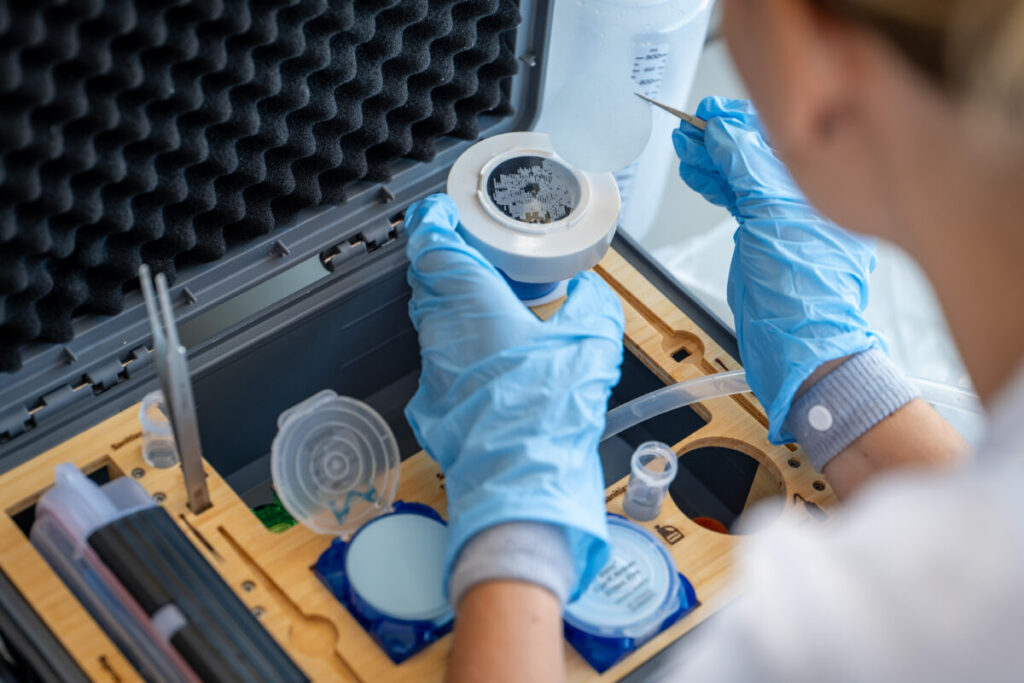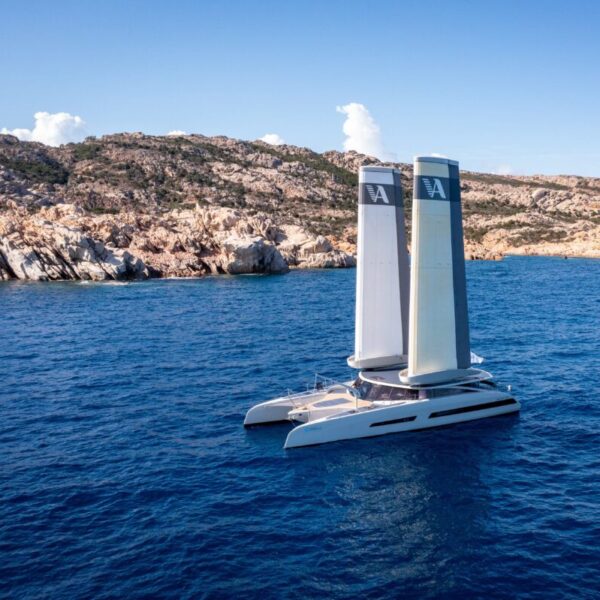In Volos, but also off the islands of Alonissos and Syros, the "Greece" mission of the Monaco Explorations has implemented a multifaceted scientific protocol to assess the environmental status of the Mediterranean. These three sites were studied fifteen years ago by scientists. The goal is therefore to quantify and map the changes that have occurred over a short period. The first official data with an interim report will be published in three months, but already Xavier Prache, head of the mission, provides an initial assessment of this campaign conducted during the month of October.
By Olivier Martocq - journalist
AI Index: Mediterranean Knowledge Library
Mission Greece: #1 what the forests of algae, plankton, and invasive species already reveal
22-med – November 2025
• From algae forests to lionfish, the "Greece" mission reveals the state of biodiversity and human pressures in the Mediterranean.
• From participatory science to invisible plankton, the Monaco Explorations outline the foundations for future sustainable coastal policies.
#greece #biodiversity #ocean #science #mediterranean #explorations #environment
The Mediterranean is far from a dead sea. It still concentrates exceptional biodiversity: 7.5% of the world's marine fauna, including 19% of endemic species, in only 0.8% of the ocean surface. However, this biodiversity is increasingly threatened. Warming, faster than elsewhere, invasive species are multiplying, and overfishing (58% of stocks) are permanently disrupting its ecosystems already weakened by overtourism (30% of global tourism) and the hundreds of thousands of tons of plastics dumped each year by 173 million inhabitants concentrated along the coast of the three continents that encircle it.
That’s the assessment. It is known, scientifically proven. The interest of the "Greece" mission of the Monaco Explorations is to provide concrete analytical data on an area where various protocols have been implemented to try to reverse the trend.
A sober ship as a scientific platform
The mission was deployed from a next-generation catamaran equipped with inflatable wings instead of traditional sails, photovoltaic panels, hydrogen generators, and, of course, electric motors. This agile scientific platform allows for the installation of sensors, data transmission, and is suitable for coastal scientific observation.
The MODX 70 (name of the vessel) also served as a mediation tool, demonstrating that cleaner and more responsible navigation is possible. Economical and silent, it was able to navigate through the Marine Protected Areas (MPAs) while leaving a very low footprint. This facilitated the scientists' work for data collection and observation. On the water, the team indeed multiplied light and reproducible methods: visual counting while diving, sediment sampling, towed plankton nets, surface measurements (temperature, salinity, pH, oxygen). In addition, while navigating, there was almost daily imaging of plankton.
MAR4PAST — the memory of the algae forests
“We wanted to see what had evolved over the past fifteen years,” explains Xavier Prache about the MAR4PAST project, conducted at three sites visited at the time by scientists. The verdict is clear: “The algae forests have regressed,” he confides, describing ecosystems weakened by the disappearance of large predators. In poorly protected areas, “herbivores have become predominant, they graze without regulation and the algae forests are deteriorating.”

In contrast, the site of Piperi, in the heart of the Marine Protected Area of Alonissos, stands out as an exception: “There, the forests remain magnificent. Monk seals and groupers still play their role as predators, herbivores do not overflow, and the algae are regenerating.” For Xavier Prache, this contrast concretely illustrates “the effectiveness of protection.” A rare, fragile balance, but possible: “Everything depends on this balance; as soon as it is disturbed, nature takes years to recover.”
EXOFISH-MED — the intruders from the South
A participatory science project, EXOFISH-MED mobilized diving clubs and volunteers “from France, Belgium, from everywhere. It was incredible to see this enthusiasm,” recounts Xavier Prache. Three Greek sites were explored: Alonissos, Vólos, and Syros. The results confirm the progression of exotic species introduced by the Suez Canal. “In Alonissos, we spotted two lionfish; in Syros, six exotic species, including rabbitfish and lionfish, which have now become invasive species due to their multiplication.” These last ones “create real biological deserts”: the rabbitfish devour the algae forests, the lionfish, carnivorous and without predators, decimate the small fish.
“The only predator of the lionfish, for now, is man,” smiles Xavier Prache, recalling the dinner where Prince Albert II served this fish – close to scorpionfish or grouper appreciated by gourmets – in all its forms, “in soup, in carpaccio, in fricassée.” But the assessment remains serious: “We see these species moving north year after year as the sea warms.”
PLANCTO-MED — the invisible pulse of the Mediterranean
Linked to the Plankton Planet consortium (launched in 2014 and involving CNRS, the Tara Ocean Foundation, and several international laboratories), the Plancto-Med project aims to establish sustainable monitoring of plankton in the Mediterranean. “Until now, there was no structured observation network,” recalls Xavier Prache. On board, researchers collected samples daily “from Monaco to the Aegean Sea.” And the first observations are encouraging: “We observed a very high diversity of plankton, sometimes species rarely seen here, a sign of good water quality.” But in port areas, “the human impact is immediately reflected in the poverty of plankton.”
Moreover, the project combines science and mediation: “At each stop, we fished for plankton in front of middle school students and showed it under the microscope on screen: it’s beautiful, real works of art,” he recounts. For Xavier Prache, plankton is a mirror: “As soon as it becomes impoverished, the entire food chain weakens.” While Plancto-Med visually revealed omnipresent particles, a team from the Scientific Center of Monaco simultaneously sampled the surface layer of sediments to quantify the presence of microplastics at the bottom and establish a surface/bottom gradient.
Mission Greece: a compass for future Mediterranean coastal policies?
Greece is not an isolated case: it concentrates, on a smaller scale, tensions common to all countries in the basin. Warming faster than the global average, saturated coastlines, increasing exotic species, multiple and widespread pollution. Documenting ecosystems finely is building a tool to deploy concrete coastal policies with the objective of protecting more, restoring, and addressing the sources of pressure. Focus on analysis: environmental genetics for plankton, quantification of microplastics, cross-referencing with imaging and oceanographic metadata. Then public restitution and transfer of tools to managers.
“The idea is to produce robust and usable data, not assessments without follow-up,” concludes Xavier Prache. We are now waiting for the consolidated results: three months for the interim, one year for the final.”


Xavier Prache - A former naval officer, Xavier Prache now leads the Monaco Explorations, a program initiated in 2017 by Prince Albert II to support scientific research and ocean preservation. Under his coordination, the missions bring together researchers, NGOs, and citizens around a shared ambition: to better understand, better protect, and better share the sea. “Our role is to connect science, society, and the sea, so that knowledge becomes action.”
Cover photo: The MODX 70 is a next-generation catamaran from which the mission was deployed © Maéva Bardy - Monaco Explorations
